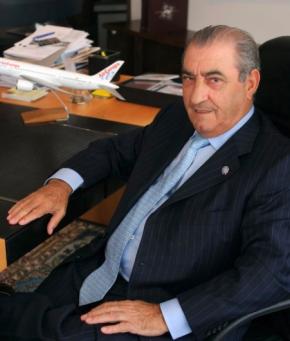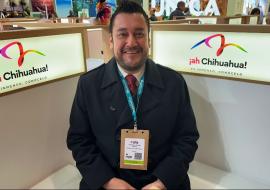Q & A with Juan Jose Hidalgo, President of the Globalia Group

Q & A with Juan Jose Hidalgo
President of the Globalia Group
By Ricardo Potts/ Photo: Globalia
A week to go into an undefined strike called by the SEPLA Union for every Monday and Thursday and beginning Sept. 22 –the union represents the Air Europa pilots- Globalia President Juan Jose Hidalgo sat down with Caribbean News Digital for an exclusive interview in which he’s aired his standpoints on this issue and other hot topics related to Spain’s travel and tourism industry.
What do you make of the strike announcement and the Airlines Association’s (ALA is the Spanish acronym) steadfast support to Air Europa?
ALA supports me because they know I’m right and because the pilots’ strike is a problem that pounds all companies. I believe the historic strike laws were enacted with a mind’s eye on the rights of the workers, not on their becoming extortion tools in the hands of small privileged groups, like pilots or comptrollers, people who earn fortunes and whose picketing lines cause major losses to thousands and thousands of citizens and to the country’s economy. I think it’s time to come up with specific regulations to avoid becoming hostages to situations like these.
This is the first time a Spanish airline is willing to accept a pilots’ strike.
I’m prepared to bear this strike for as long as SEPLA sees fit because it’s an unfair strike based on fabrications. And when something’s unfair I’m just unwilling to sit down and negotiate. I say it time and again: this company has not outsourced a single flight. Since I became president of Air Europa, just when I picked up the pieces of this downtrodden company back in 1991, the airline has done nothing but grow, hire pilots and train them well. It has never laid off a single employee just to outsource any flight.
In addition to the outsourcing issue you’re strongly against, SEPLA is also complaining that the agreement is not being honored.
They’ll be held to account for both their words and their actions. I’m making good on the agreement a hundred percent. They say their agreement is something they cherish and I agree, despite the fact that their contract has been built on duress and strike threats. That’s why I say this agreement is valid as long as the company exists. If the company is scrapped, I hope they can come up with an alternative to fly easily.
Do you feel under duress?
The point is there seems to be two front offices in this company, one that creates jobs and makes the group grow, and another one attached to SEPLA. It seems to me the SEPLA company is far more important than the one that creates jobs.
Have you counted on the support of Globalia employees in this conflict with the pilots?
I’m personally very thankful to the Globalia employees for the support they have given me. And they have pretty good reasons to do so. They know that if things get tangled up, we’re all going to end up bad. That’s pretty unfair. There are some 500 pilots in Air Europa and only a minority of them, around 50 or 60, is unpleased. It’s really bizarre that a bunch of 50 or 60 people can actually damage a payroll of 25,000 workers. In my opinion, what those 50 or 60 people do is go their own way and leave those 25,000 employees alone.
Does the decision to put this matter in the hands of your lawyers stand?
Well, my lawyers are not going to move a finger without talking to me first and we’ll make the legal decisions and take the actions we see fit. What we won’t do is hold talks with SEPLA and Air Europa’s management. They’ll stand up for their rights, the ones on the picket lines, all the rights in the world. For my part, I’ll stand up with might and main for the company’s right. As a businessman, whatever rights I might have will be defended by and through my lawyers.
Could Air Europa’s image get tainted as a result of this situation?
I don’t think so. Air Europa has a pretty good image and it gets its job done. It’s been a painstaking effort and this situation won’t make a dent on that image. It’s taken a lot of hard work to get this rock-solid image for an innovative company, with a new fleet of jetliners and absolute commitment to the market, and this is not going to get weak because, in addition to that, we’re going to be very discipline.
Let’s now talk about the rest of the company. The summer is gone and we’re moving into the second half of the year. How do you assess the company’s outcomes in the first half of the year, regardless of the ongoing economic situation worldwide?
This has been a bad year, like others within this crisis, yet not that bad for other partnerships within our group, like Halcon, Pepephone or Travelplan. Our stocks have dipped this year, but I hope it won’t stay that way for forever more. But if these prices maintain such level, customers won’t be able to pay what must truly be taxed on the bill. We’d be forced to raise fares so much that customers would be exhausted, and that’s a huge problem. I don’t believe that companies will obtain significant benefits this year. I’ve read pieces of news related to Lufthansa, Air France, TAP, American companies which are actually affected, as well as the rest of us.
As for my group, the air company will suffer the most this year, because of four reasons. In the first place, the excessive cost of fuel. The second reason is represented by conflicts among controllers, which have brought about wide repercussion all over the year; delays, compensations and many other problems. The third one is volcanic ash that has also caused damage due to airport shutdowns and implemented precautions. The fourth element is the governmental imposition over companies to implement security systems and that has been reflected in our prices, the surcharges we have on fares, with constant increases. These four problems aren’t debatable and have nothing to do with business management, but they’ll have negative impact this year.
On the other hand, the number of travel agencies has grown up, especially with franchises, which have attracted some 200 companies. What have been the results of that policy? Will you continue placing your bets on franchises?
We’ll stay on the same track, the more agencies we have with more private businessmen defending their own interests, the more benefits for our group and the stronger we’ll become in that field. What matters the most is having one businessman leading that office, defending its economic rights, making money; that’s what must be strengthened because, if there are more people interested in creating their own business and we can protect them, give them our brand and supply them with products. We’ll be rewarded at the end of the day.
What do you think about perspectives for this industry for the end of the year and in the face of 2012?
I keep on saying that the travel industry in our country seems to have overcame the economic situation, we’ve been also lucky with indirect rebounds from Northern Africa, which have favored Spanish facilities in Canarias, Balearics, Costa del Sol or Levante. These events have favored hotels and inbound tourism.
Another element to be analyzed is outbound tourism, which has been decreased this year and we, dedicated to this segment, have had to cancel several flights to Tunes, Morocco and Egypt, we’ve cut off some destinations and that’s why our outbound plan has been decreased. I don’t believe that this situation will be immediately normalized, but as long as it exists, the inbound segment will do it better than the outbound one.
On the other hand, we have the world economic crisis that affects day by day, economies in Europe and all over the world are falling apart, the construction isn’t moving forward and grand suppliers are stuck. However, we still have something that might be considered a privilege in our sector, in spite of this drastic situation we’re facing, people still love traveling and spend their money. Nevertheless, if we maintain this pace, one step backward each day, and people decide saving their money and stop spending on tourism, we’d have to return to the 1940s or 1950s; though I hope that it won’t happen.
Precisely, going back to those 1940s or 1950s, it’s been a long time since you started your career transporting migrants that returned to Spain from Switzerland. After all those years, how do you actually feel regarding to what you began and what you’ve achieved, or what do you think you need fulfill?
I’m very satisfied. I worked until I was 27 years old to give money to my parents; I ran all kinds of experiments in my home town and in Switzerland. When I was 27, I began my journey and, until now when I’m 70 years old, I’ve spent 43 years fighting to create a pretty-well thought, studied and analyzed organization, which deals with the entire tourism system taking into consideration air transportation, hotels, tour operation, travel agents, etc. I won’t say that I’ve fulfilled my personal satisfaction, I’ll continue doing things with my actions and thought, that’s part of myself, and the way it’ll be through the end of my days. I won’t hesitate when it comes to business opportunities, expansion, that’s who I am and I won’t change.














